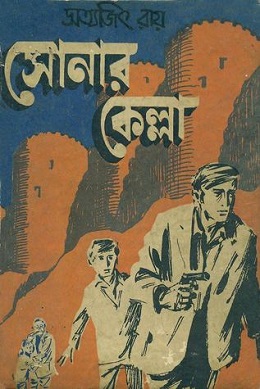
Sonar Kella, also Shonar Kella, is a 1971 mystery novel written by Bengali writer and filmmaker Satyajit Ray. In 1974, Ray directed a film adaption of the book, also named Sonar Kella, starring Soumitra Chatterjee, Santosh Dutta, Siddartha Chatterjee and Kushal Chakraborty. The movie was released in the United States as The Golden Fortress. It is the first film adaptation of Ray's famous sleuth Feluda and was followed by Joi Baba Felunath.
Sarnath Banerjee is an Indian graphic novelist, artist, filmmaker and co-founder of the comics publishing house, Phantomville.
Corridor is an Indian graphic novel, written and illustrated by Sarnath Banerjee, set in contemporary Delhi. A shop owner by the name of Jehangir Rangoonwalla interacts with other residents of Delhi visiting his shop.
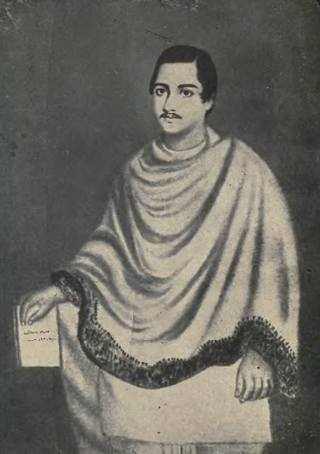
Kaliprasanna Singha, well known by his pen name Hootum Pyancha, was a Bengali author, playwright, and philanthropist. His most famous work was the translation of the ancient Hindu epic Mahabharata into Bengali. Singha's book Hootum Pyanchar Naksha, a compilation of satirical social sketches, is another work that is noted for reflecting Bengalee urban society of the time. He is also remembered as a philanthropist who helped several people and movements in distress.
Ramnidhi Gupta, commonly known as Nidhu Babu, was one of the reformers of Bengali tappā music.

Pradip Kumar BanerjeeFIFAOM was an Indian professional footballer who played as a striker for the India national football team. He also captained the national team and later on became the coach of the national team. He represented India in 52 official matches and scored 16 official goals for the country. He was one of the first recipients of Arjuna Award, when the awards were instituted in 1961. He was awarded the prestigious Padma Shri in 1990 and was named Indian Footballer of the 20th century by IFFHS. In 2004, he was awarded the FIFA Order of Merit, the highest honour awarded by FIFA.
Phantomville is a graphic novel company set up by writer/artist Sarnath Banerjee and Anindya Roy. Its aim is to provide a platform for Indian writers and artists to produce mature graphic novels.

Bishnu Dey was a leading Bengali poet, writer, essayist, academician, art appreciator, and connoisseur in the era of modernism and post-modernism.
Chowronghee is a 1968 Indian Bengali drama film by Pinaki Bhushan Mukherjee, starring Uttam Kumar and Subhendu Chatterjee who played the lead role and Biswajit Chatterjee, Supriya Devi and Anjana Bhowmick in supporting role. The music of the film composed by Ashima Bhattachariya who also produced this film. The film is based on a Bengali novel of the same name by Shankar and was a huge hit in its own right. The film is regarded as one of the greatest film in Bengali cinema and for Uttam's career.
Krishanu Dey was an Indian footballer from Kolkata, India. He was an attacking midfielder and was known as the "Indian Maradona" among his fans due to his footballing skills and playing style.
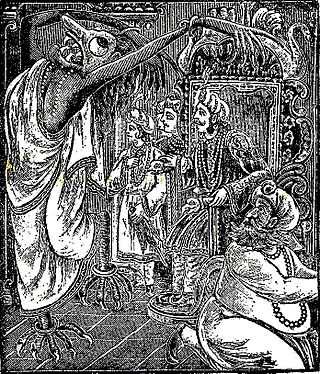
Ghosts are an important and integral part of the folklore of the socio-cultural fabric of the geographical and ethno-linguistic region of Bengal which presently consists of Bangladesh and the Indian states of West Bengal and Tripura. Bengali folktales and Bengali cultural identity are intertwined in such a way that ghosts depicted reflect the culture it sets in. Fairy tales, both old and new, often use the concept of ghosts. References to ghosts are often found in modern-day Bengali literature, cinema, radio and television media. There are also alleged haunted sites in the region. The common word for ghosts in Bengali is bhoot or bhut. This word has an alternative meaning: 'past' in Bengali. Also, the word Pret is used in Bengali to mean ghost. In Bengal, ghosts are believed to be the unsatisfied spirits of human beings who cannot find peace after death or the souls of people who died in unnatural or abnormal circumstances like murders, suicides or accidents. Non-human animals can also turn into ghosts after their death. But they are often associated with good luck and wealth in Bangladesh.
Shyamal Mitra was an Indian versatile playback singer and music director along with Hemanta Mukherjee and Manna Dey. Mitra had also worked in many Hindi and Bengali films as a music director and film producer. He was the most notable musician of the golden era of Bengali music industry. His baritone voice reflected a range of emotions. Besides recording a huge number of popular Bengali basic songs, he also worked as a playback singer in more than a hundred Bengali films and directed music in more than fifty Bengali films. He also sang in various other Indian languages, like Hindi, Assamese, and Oriya.
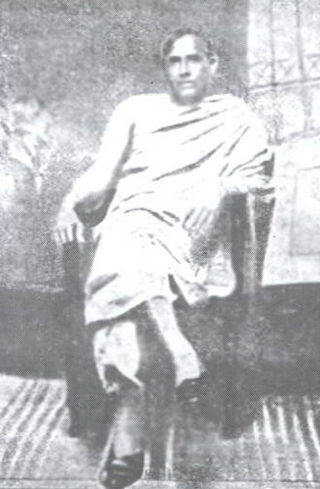
Jatindra Nath Banerjee was one of two great Indian nationalists and freedom fighters – along with Aurobindo Ghosh – who dramatically rose to prominence between 1871 and 1910.

Anupam Roy is an Indian singer-songwriter, music director, composer, songwriter, guitarist, playback singer from Kolkata, India. He made his debut with Amake Amar Moto Thakte Dao & Benche Thakar Gaan, which appeared on the soundtrack of the 2010 Bengali film Autograph. Since then, he has gone on to compose, write lyrics and sing for many Bengali films.
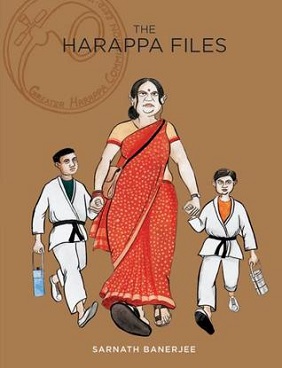
The Harappa files is a 2011 graphic novel by Indian graphic artist Sarnath Banerjee. It is the author's third graphic novel after Corridor and The Barn Owl's Wondrous Capers. The book is introduced as a set of "loosely bound graphic commentaries" produced in a period of three years.
Feluda is an Indian-Bengali detective media franchise created by Indian-Bengali film director and writer Satyajit Ray, featuring the character, Feluda. The titular character is a private investigator starring in a series of Bengali novels and short stories. The detective resides at 21 Rajani Sen Road, Ballygunge, Kolkata, West Bengal, India. Feluda first made his appearance in a Bengali children's magazine called Sandesh (সন্দেশ) in 1965, under the editorialship of Satyajit and Subhas Mukhopadhyay. His first adventure was Feludar Goendagiri.
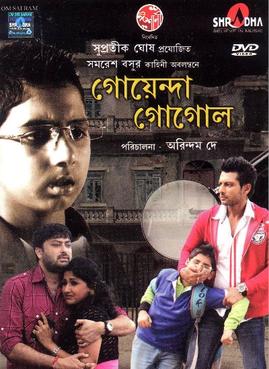
Goyenda Gogol is a 2013 Indian Bengali suspense film, directed by Arindam Dey and produced by Supratik Ghosh under the banner of Ishani Films. Based on the story Sonali Parer Rahashya by Samaresh Basu, the film features child actor Ahijit Ghosh and Indraneil Sengupta in the lead roles. It boasts of being the first film to feature a tattooed Bengali private detective. Saheb Chatterjee and Rachana Banerjee also play parents for the first time in this film. The film was released on 24 May 2013.
Satyanweshi also spelled Satyanveshi, is a detective story written by Sharadindu Bandyopadhyay featuring the Bengali detective Byomkesh Bakshi and his friend, assistant, and narrator Ajit Bandyopadhyay. It is the first Byomkesh adventure written by Sharadindu Bandyopadhyay.

Atithi is a 1965 Bengali drama film based on a short story by Rabindranath Tagore, and directed by Tapan Sinha. It tells a simple story about a teenage boy who prefers the life of a wanderer to the confines of a domestic life. At the 13th National Film Awards, it won the National Award for the Second Best Feature Film. It also won several BFJA Awards. It was India's competitive entry at the Venice International Film Festival in 1966, where it was nominated for the Golden Lion. The film was remade in Hindi as Geet Gaata Chal.
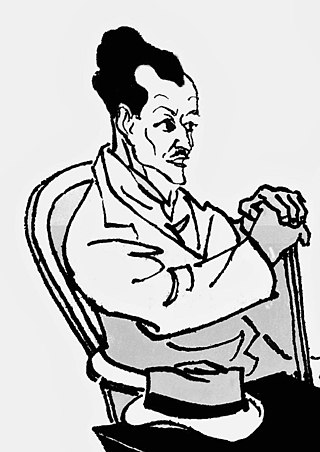
Ghanashyam Das alias Ghanada, the protagonist of the Ghanada series of science fiction novels written in Bengali, is a fictional character created by Premendra Mitra in 1945. In the novels, the character fights evil and stands against international terrorism. The far-fetched stories take place in multiple international locations, and across a historical timeline. He is depicted regularly outwitting his fellow boarders of the mess-bari at 72, Banamali Naskar Lane, Kolkata (Calcutta). Ghanada was a personification of Premendra Mitra's anti-fascist humanistic ideologies and moral universe. His stories were notably accurate from a historical, geographical and scientific standpoint.












